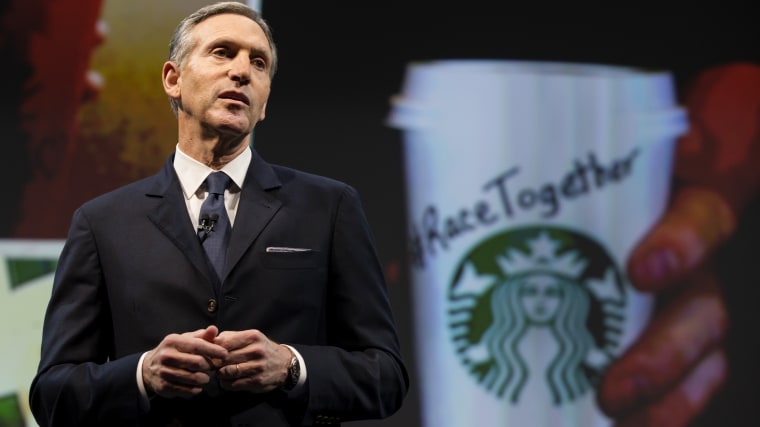Former Starbucks CEO Howard Schultz, eyeing an independent presidential bid that polls show would help re-elect Donald Trump, participated in a Fox News forum yesterday and fielded a question on immigration. Schultz began by arguing that George W. Bush's reform plan failed because Democrats were "unwilling to provide the president and his party a victory."
That was demonstrably false. It was Republicans who killed the Bush/Cheney plan. Don't take my word for it; look at the numbers: most Democratic lawmakers voted for Bush's proposal, while most GOP lawmakers voted against it.
In other words, the very first point Howard Schultz tried to make on the issue was plainly wrong. Why he didn't better prepare for the event is unclear.
The independent went on to announce his opposition to a border wall, while endorsing a pathway to citizenship and heightened border security, effectively endorsing the entire Democratic vision without explicitly saying so.
Schultz went on to argue:
"It is a crisis, but it can be solved. It cannot be solved currently, because of the ideology of both parties. But if I was fortunate enough to become president, this is what I can promise you. I'm about accountability, I'm about results."I would bring the people in to the room. I would say, 'You cannot come in here with ideology or ego.' What I want to do is I want to put an empty chair in the room, and that chair represents the American people. And we're not going to leave the room until we solve the problem for the American people."
The role of empty chairs in recent political history is far from glorious. Clint Eastwood tried to debate an empty chair at the Republican National Convention in 2012, and he somehow managed to lose. House Republicans did a photo-op with empty chairs during their 2013 government shutdown, which backfired badly.
Schultz's vision, alas, is no better.
The whole idea that a well-intentioned president can solve complex problems by "bringing people into a room" -- without or without an empty chair -- is a fantasy embraced by people detached from the realities of federal policymaking.
Indeed, three years ago, another inexperienced businessman with no record of public service delivered an eerily similar message. "You're supposed to cajole, get people in a room, you have Republicans, Democrats, you're supposed to get together and pass a law," the candidate said in 2016.
That candidate, of course, was Donald Trump -- who's discovered that this model is woefully inadequate.
On Tuesday, former HUD Secretary Julian Castro unveiled a detailed, comprehensive immigration reform plan. Love it or hate it, Castro's blueprint is detailed, bold, and ambitious, and can serve as the basis for a meaningful national debate.
Two days later, Howard Schultz shared his own vision for immigration reform -- which is apparently built on the metaphorical use of an empty chair.
One of these approaches is emblematic of a serious way to seek the nation's highest office. One isn't.
